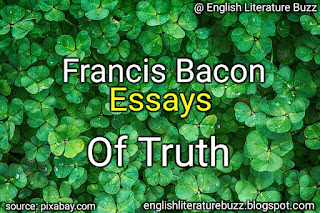Francis Bacon: Of Truth
 |
| Pixabay.com |
Of Truth
In this essay, Bacon considers two aspects of Truth: objective truth or superlative truth on one hand, and on the other, subjective truth which is really truthfulness, and in operative in social life. The essay ‘Of truth’ contains several ideas which immediately appeal to the reader because of their obvious truth to human nature.
The reader quickly responds to such ideas. Because at once recognizes their validity. For instance, Bacon have tells us that human beings are generally attracted by lies.
Lies told by poets in their poetry please the imagination; lies told by traders bring them financial gain; but why people should tell for the sake of lies is not clear. Bacon than goes on to say that truth gives greater pleasure when a lie has been added to it. If a man were to be deprived of his false opinion, false hopes, and false judgment, he would feel miserable.
Having expressed these views, Bacon speaks like a moralist and says that much harm is done by lies which sink into the mind and settle down there. Truth is the supreme good for human being, he says. He quotes Lucretius who said that the greatest pleasure for a man was the realization of truth. Bacon says that truth is important not only in theological and philosophical fields, but also on the sphere of ordinary daily life. Falsehood, he says, brings nothing but disgrace. Now such ideas are bound to appeal even to a reader who, in his actual dealings, does not give a high place to truth.
The essay ‘Of truth’ is frankly didactic. The object if the writer is to instill into the minds of the readers a love of truth. A man’s mind, says he, should ‘turn upon the poles of truth.’
In this essay ‘Of truth’ Bacon appears to be a ‘genuine’ admirer of truth and seems to install the love of truth in his readers.
‘It is heaven upon earth, to have mind move in charity, rest in providence and turn upon the
poles of truth.’
Bacon also points out that:
‘Falsehood is like an “alloy’ in gold and silver, which makes the metal works better even though it
reduces the value of the metal.”
He says:
‘A mixture of a lie doth ever add pleasure.’
By pointed out this he dilutes all that he has said in this essay in praise of truth. He compares falsehood to an alloy on a coin of gold or silver. The alloy makes the metal work the better, but it lowers the value of the metal. There are allusions and quotations in the essay ‘Of truth’. We have allusions to Pilate, Lucian, Lucretius, and Montaigne with quotations from the Bible in this essay. These allusions and quotations enrich this essay and make it more interesting.
Related Topics:
Jonathan Swift: As A Misanthropist
